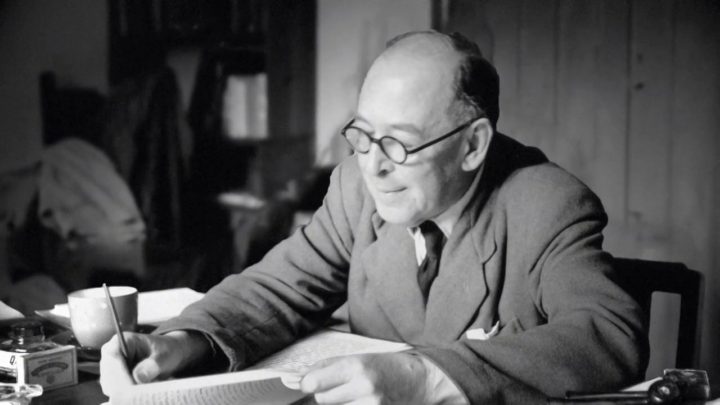Books are important for me. I enjoy reading, but I think my interest in books derives from my interest in learning. Since childhood, I’ve enjoyed learning and thinking, and books have always been an efficient source for that.
And, yes, I’m okay if that makes me a nerd.
Because of this interest, I have also been interested in the reading habits and intellectual abilities of famous intellectuals. I take an interest in stories of their intellectuals feats that is likely similar to my friends’ interests in the physical feats of famous athletes.

C. S. Lewis’s Memory of What He Read
C. S. Lewis is one of the most widely read English writers of the twentieth century, especially among Christians. But he was also a professor of literature. As a professor, he was well-respected and his tutorials were popular.
Part of his giftedness as a scholar, according to Dr. Alister McGrath, was his incredible memory. In his terrific biography of Lewis, C. S. Lewis–A Life, McGrath writes:
“One of Lewis’s abilities must be noted here, for it is of obvious relevance to his gifts as a writer: his formidable memory. Lewis’s mastery of the Renaissance skill of the ars memorativa unquestionably contributed to the success of his Oxford lectures, enabling him to recite quotes from memory. Kenneth Tynan (1927-1980), an “angry young man” of the 1960s, whom Lewis tutored in the 1940s, recalls Lewis playing a memory game with him. Tynan would read aloud a line he had arbitrarily chosen from a book he had selected from Lewis’s library. Lewis would then identify the work in question, and set the line in its proper context.
Lewis, it seems, could remember texts primarily because he had absorbed their deep inner logic. His diaries bear witness to this habit of reading an astonishing number of texts; his personal library contains annotations indicating when a book was first read, and then read again….” (166)
Two Tips For Remembering What You Read
If I’m understanding McGrath correctly, Lewis’s memory of so many books came from two things:
- Lewis read a lot. I read once, though I don’t remember where, that someone had looked over Lewis’s diaries for a year of his life and counted almost two hundred books that he mentioned reading that year.
- Lewis reread a lot of book. I get this from two things that McGrath says. First, he says that Lewis “absorbed [a book’s] deep inner logic.” And McGrath mentions that markings in books recorded when Lewis reread books.
I think it is safe to say that you would remember more of what you read if you read more and and you reread more books.
Rereading to Get a Text’s “Deep Inner Logic”
I am departing somewhat from what McGrath writes. But I think that one of the ways that we can get a book’s “deep inner logic” is to reread the book several times. Mortimer Adler, in his How to Read a Book , recommends that many readers should aim to read a book three times to fully engage it. (Each reading, according to Adler, is for a different purpose; he does think that skilled readers can accomplish all three purposes in just one reading.)
I don’t reread books as often as I should. But what is remarkable about Lewis’s reading habits – at least, what I infer about his reading habits from what he wrote elsewhere, as we’ll see – is that he didn’t just reread some books two or three times. It is rare that I reread a book even once. I can only name a handful of books in my life that I have reread twice. But Lewis implies elsewhere that he reread some books way more than that.
In An Experiment in Criticism, Lewis begins by taking pains to distinguish between two types of readers and different types of books. Lewis writes:
“In the first place, the majority never read anything twice. The sure mark of an unliterary man is that he considers ‘I’ve read it already’ to be a conclusive argument against reading a work. We have all known women who remembered a novel so dimly that they had to stand for half an hour in the library skimming through it before they were certain they had once read it. But the moment they became certain, they rejected it immediately. It was for them dead, like a burnt-out match, an old railway ticket, or yesterday’s paper; they had already used it. Those who read great works, on the other hand, will read the same work ten, twenty or thirty times during the course of their life.” (p. 2)
But notice: Lewis entertained reading a book “ten, twenty or thirty times” in your life! Imagine how well you’d understand your favorite book if you reread it twenty times!
Conclusion
I have no doubt that C. S. Lewis has a memory that is uncommon. I’m sure that many of my readers – at least the nerdier ones among you – aspire to such a memory. But maybe one reason that C. S. Lewis had such an uncommon memory is that he had such uncommon reading habits: he read and reread a lot of books.
Join other dedicated readers of Thinking and Believing and subscribe to the email list. You'll receive every new post in your inbox, so you never have to worry about missing a post. Click here to subscribe.